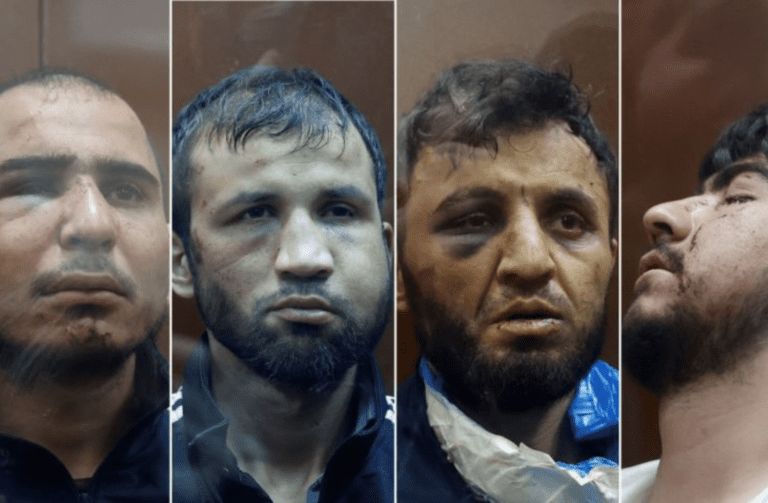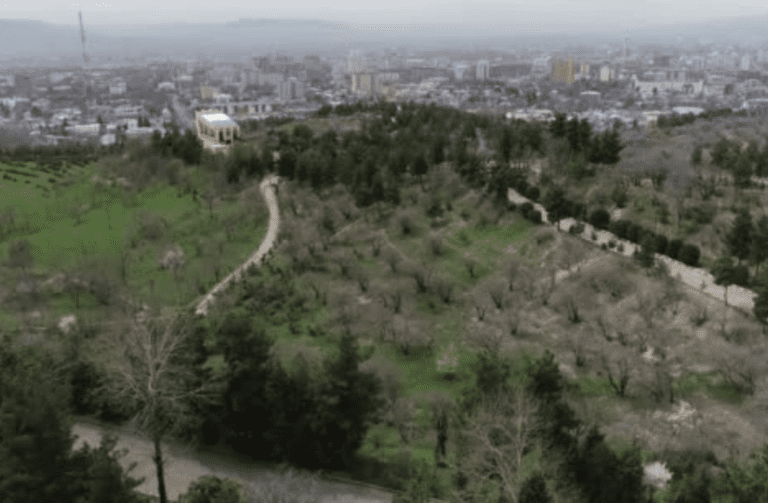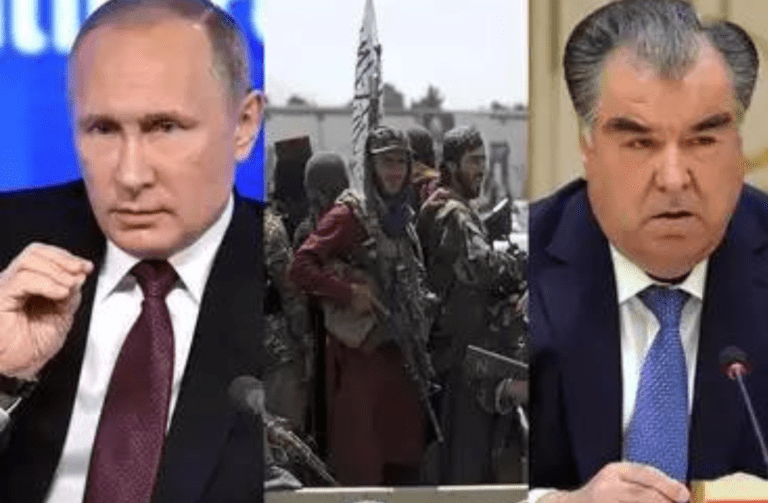Suspects Arraigned in Moscow Concert Hall Bombing Case

March 30, 2024
Suspects Arraigned in Moscow Concert Hall Bombing Case ……
Last Saturday, four Tajik nationals were presented in a Moscow court, accused of carrying out a deadly bombing at the Moscow Concert Hall, which claimed the lives of at least 139 individuals.
Footage from the trial reveals the four suspects, identified as Faridun Shamsiddin, Dal’ezhon Mirzoyev, Saidakrami Rakhbalizoda, and Muhammad Sobir Fayzov, with visibly injured faces, being brought into the court.
Videos of the interrogation, leaked by Russian security forces, depict one of the suspects receiving electric shocks during interrogation.
Shamsiddin, aged 25, displayed a swollen face during the proceedings. They also face allegations of recruiting two others, who were apprehended on Monday.
I visited the village where Shamsiddin’s family resides in Tajikistan. They live in Loyob village, located about 40 kilometers northwest of the Tajik capital, Dushanbe, with approximately 60 families residing there.
Loyob is a mountainous village with dry land and typical weather, devoid of any nearby rivers. The youth of the village primarily engage in agriculture, construction, or work in the local markets.
Last Saturday, Tajik security forces were seen here, reportedly bringing the suspect’s father for questioning.
Speaking on condition of anonymity, a villager informed that Shamsiddin had traveled to Russia six months ago. His swollen face upon return alarmed the villagers.
Shamsiddin is one among thousands of Tajik individuals who, due to low wages and unemployment, migrate to Russia, leaving their homeland behind.
Tajik authorities claim that last year alone, 652,000 Tajik citizens went to Russia, but Russian officials suggest this number could be in the millions.
Residents of Loyob, situated 40 kilometers from the Tajik capital Villager Whay Say About Moscow Concert Hall Bombing Case

Residents of Loyob, situated 40 kilometers from the Tajik capital, Dushanbe, expressed disbelief that a 25-year-old could orchestrate such a terrorist attack.Suspects Arraigned in Moscow Concert Hall Bombing Case
After viewing the interrogation footage of Shamsiddin, one villager remarked to me, “Security officers tortured him so much that he’s ready to take responsibility for Lenin’s death.”
A leaked three-minute video from Russian security officers portrays them trembling, with one soldier gripping their hair, while they confess to orchestrating the Moscow massacre for 500,000 rubles ($5,400).
Tajik President Emomali Rahmon condemned the attack as “shameful and horrendous,” urging the public to shield their children and youth from extremist groups and prevent tarnishing the Tajik nation’s name.
Responsibility for the massacre has been claimed by the Islamic State group, with the release of a video of the attack verified.
Russian President Vladimir Putin alleged jihadist aid from Western nations and Ukrainian intelligence agencies, a claim dismissed by Ukraine.
President Rahmon contacted Putin on Sunday, denouncing the attackers and emphasizing, “Terrorists have no nationality, homeland, or religion.”
Hardships of Tajik Nationals in Russia After Suspects Arraigned in Moscow Concert Hall Bombing Case

Since the attack last Friday, Tajik nationals living in Russia have started feeling its repercussions.
Suspects Arraigned in Moscow Concert Hall Bombing Case.A Tajik migrant worker residing in Moscow informed me that security presence has intensified, with scrutiny on Asians and checks on their documents. Those without proper documentation fear deportation.
He expressed concern for his future, saying, “Now that the attackers have been identified as Tajik nationals, Russians might grow hostile towards Tajik people.”
Nearly every Tajik family has at least one member working in Russia. Remittances from Tajik migrants are crucial for the nation’s economy, and any decline could significantly impact thousands of families in Tajikistan.
Iraj Ashurov, a 40-year-old construction worker, frequently travels to Russia with his two brothers and two sons. Recently, he returned to Tajikistan to visit his family but is unsure whether to return to Russia after the recent Moscow incident.
I returned from Russia just a month ago and was planning to go back to Moscow, but after the recent incident, I’m worried about my brothers.”
“In such cases, pressure on migrant workers intensifies,” he added.
Putin’s chief aide, Russian leader Sergey Mironov, proposed ending visa-free entry for migrants from Central Asian countries to strengthen national security, believing stricter immigration policies are necessary to prevent extremist attacks.
Mironov believes that migrants from Central Asian countries are more susceptible to recruitment by extremist groups, with Turkey being a key hub due to visa-free entry for Tajik and Russian nationals, making it a focal point for ISIS recruitment.
While Tajik authorities assert that between 2014 and 2016, around 2,000 Tajik citizens joined ISIS, with the majority recruited in Russia, experts like Qosim Shah Iskandarov, head of the Center for Afghan Studies in Dushanbe, argue that migrant workers from Central Asia are more vulnerable to recruitment by extremist groups.
Iskandarov highlights Turkey’s significance, where Tajik and Russian nationals can enter without a visa. Consequently, ISIS activities in recent times have primarily centered around this ISIS hub.
The ongoing Moscow trial has raised concerns not only about security measures but also about the vulnerability of migrant workers to radicalization, amplifying the need for comprehensive strategies to combat extremism.